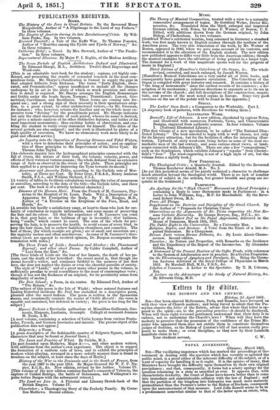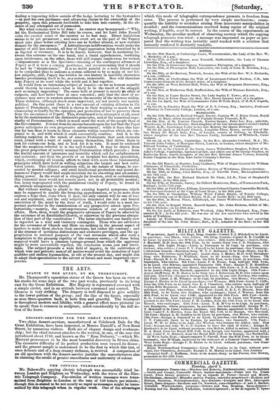PAPAL AGGRESSION.
Glasgow, March 1851.
Sin—The vacillating impotence which has marked the proceedings of Go- vernment in dealing with the question which has recently so agitated the public mind, is a proof either of the inherent difficulty of the subject, or of a want of capacity for handling it as it ought. It is the opinion of many, that Ministers have brought the difficulty upon themselves by their own original precipitancy; and that, consequently, it forms but a scanty apology for the question remaining in a state as unsettled as ever. It appears that, with characteristic dexterity, the Court of Rome have known better than to come into immediate and unmistakeable collision with the law of England ; and that the partition of the kingdom into bishoprics was much more maturely premeditated than the Premier's letter to the Bishop of Durham, consequent upon the announcement of that measure. Lord John Russell seems to be in a predicament somewhat similar to that of the factor upon an estate, who, finding a vapouring fellow outside-of the hedge lecturing to the bystanders —in part his owirpartisans--and advancing daims-bs the ownership of the -property, upon this proceeds forthwith to take him into custody, inthe ab- -sence of any attempted act of possession. But what remains-now to be done ? An answer may besupposed—" Why, Jet the Ecclesiastical Titles Bill take its course, and let Lord John Russell calm the excited mind of the country as be best may. Direct legislation enems to be yet premature ; and some overt act on the part of the Papacy ,inust take place before existing laws can be further altered, or new statutes framed for the emergency." A latitudinarian indifferentism would make the matter of still less account,. ell fear of Papal aggression being described by it as bigoted or visionary. It is to be feared, however, that in mediating be- tween this extreme on the one hand, and a timid apprehension, bordering upon intolerance, on the ether, there will still remain ampleroom for writers —dispassionate as is the Spectator—treating of the contingent advances of Popery as if it were a coming pestilence, and recommending that it should be met by "disinfectants." It is no doubt painful to a truly liberal mind to he compelled thus to indictee a system adhered to by -so many of our fel- low subjects; still, Popery has written its own history in indelible characters besides proclaiming itselt to be, as a system, immutable. Men will therefore lake Popery at its word while the world and it last together.
It would form an interesting subject of inquiry—so far as human sagacity could therein be exercised—what is likely to be the result of the struggle now seemingly impending? The maw Will at present is merely an affair of nutposts, and had better been at once conceded; only that the show of re- sistance may serve to awaken attention to thesecurity of the defences within. These defences, although much more important, arc not merely nor mainly politicaL On this point there is a vast amount of existing delusion in the minds of Protestants, and which is shown in their trusting so much to and clamouring so loudly for the operation and protection of law to preserve them from the ascendancy of Popery. This, if continued to he attempted at all, must hely the maintenmiee of the distinctive principles, and of the numerical-supe- Tionty of Protestantism; which is much more the work of the people than of the Government. It isnot from its encroachments upon the law that the Papal power anticipates its own progressive advancement; while it fears this bar- rier far less than it trusts to those elements within ourselves which are con- genial it, and with which it could successfully combine. And it is the raking suspicion in the minds of sincere Protestants that such elements exist, joined with a want of unity among themselves, that drives them to leak for extraneous help, and to look for it in vain. It must be confessed that the suspicion referred to is too well founded. It may be drawn from the great proportion of merely nominal Protestantism which prevails ; from the fearful amount of ignorance and brutality which call for enlightenment and restraint; and from the growth of an incipient but daring speculation, which, overleaping all bounds, affects to treat with scorn those fundamental principles which have held in willing subjection the largest and best culti- vated minds. This inflated scepticism will, in the nature of things, be suc- ceeded by mental collapse; and amidintelleotual prostration soidmoral de- basement Popery would find ample materials for its absorbing and all-assimi- lating power. in the event of a struggle for freedom, civil or ecclesiastical, this elemental mass would not remain inert, nor in all probability neutral.; but, being impregnated with the pestiferous vitality of Popery, be found in an attitude antagonistic to liberty. But without waiting to allude to -the existing hopeful symptoms, which may be supposed to qualify the foregoing apprehensions, or to do more than express a hope that, come when it may, the only contest will be one of rea- son and argument, and the only subjection demanded the fair and honest conviction of the mind by the force of truth, I would refer to a most im- portant particular in the consideration of any prospective attack upon Pro- testantisio—namely, the contemporaneous relation of our ecclesiastical affairs. How, .then, would the progressive advances of Popery be affected by the existence of an tMblished hurch, or otherwise by the previous abroga- tion of that part of the constitution ? The latter alternative can hardly now be regarded as a will and visionary contingent. Those who are advocates for the rseveranea of Church and &ate see nothing in the present aspect of matters to make them slacken their exertions, but rather the contrary ; and if the absence of invidious distinctions and exclusive privileges, and the ap- propriation to national purposes of the vast revenues which offer such a temptation to the grasping cupidity of the common enemy,—if these being removed would leave a common vantage-ground from which the aggressor tElillahe.t be more successfully repelled, the conclusion seems just and inevi- table. a wide -field of inquiry, in the cultivation of which wise andlathotic men of all parties would avoid the irritation of legal quibbles and maws logomachies, so rife at the present day, and might aim
to adapt their spsculations to the advent of future and more important emer-































 Previous page
Previous page